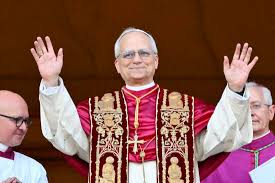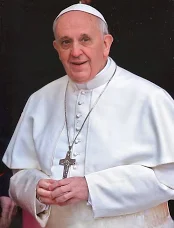
The installation of Dermot Farrell as Archbishop of Dublin took place on Tuesday 2 February in St Mary’s Pro Cathedral. The Principal Celebrant at the Mass of Thanksgiving was Archbishop Farrell who was joined by Archbishop Diarmuid Martin, Archbishop Emeritus of Dublin and His Excellency Archbishop Jude Thaddeus Okolo, Apostolic Nuncio to Ireland.
Due to Covid-19 restrictions there was no public attendance at the Mass which was instead live streamed on the website of Dublin Diocese.
In his homily Archbishop Farrell said, “Today, I stand before you more than aware of my own inadequacies. But you and I also stand before God, the giver of gifts (see Matt 6:25–33), who is our hope and our help (see Pss 61:5, 26:1). It is a daunting task, but I am sufficiently acquainted with the calls of Isaiah, Jeremiah, Mary and others to realise that the enormity of the challenge is more than matched by the power of the One who has called me. Like Mary and the prophets of old, in the depth of my shortcomings, I also am called to trust the words of Abraham, our father in faith: “God will provide” (see Gen 22:8, 14). The God who calls us all can be counted on to empower us to respond generously to the call in this local Church.
“I am happy to embrace this new mission. I come to you with hope in my heart. It is not a naive hope that everything will be better tomorrow, but a hope born of a conviction that transcends these difficult days through which we are living, and a hope that transcends the limits our own capabilities. Faith is not an invitation to put up with life’s difficulties and frustrations. Rather, faith asks us to see these as a time of grace. This time – both in the crisis that is the global pandemic, and in the many crises confronting the Church – this very time, with all its frustration and fear, is rich with possibilities, already carrying the future, overflowing with Christ (see Walter Burghardt, Sir, We Would Like to See Jesus, p. 36). What we do in the coming months and years, how we live out of these challenges and opportunities, will define who we really are as a people of faith. We must embrace the future: after all, today and tomorrow are God’s gift to us. Christ goes before his disciples: we follow. Rooted in our heritage, rooted in who we have become, Christ calls us forward (see Matt 4:19, Mark 1:38, John 21:15–18, Gal 1:15–16). The living “Church is always on the move, always going out and never withdrawn into itself. Jesus did not come to bring a gentle evening breeze, but to light a fire on the earth [see Luke 12:49]” (Pope Francis, Homily at the Opening of the Amazon Synod, October 6, 2019).”
Reflecting on today’s celebration of the World Day of Consecrated Life, the archbishop said, “I am particularly happy to take up this new role on the World Day of Consecrated Life. The women and men who dedicate their lives to the call of the gospel are at the heart of life of our Church. Without their service, without the presence of their communities, our Church would be a very different Church. They have been at the forefront of renewal in the Church, taking bold initiatives, and making significant sacrifices, putting flesh on the hope that was within them (see 1 Peter 3:15). This is not a mission that belongs to the past. In another age, they were at the forefront of addressing the educational, social, and health of those who risked being left behind. Today they continue their prophetic ministry in the service of those whom our society might prefer not to see: those who suffer from addiction, those who struggle to put food on the table, women trafficked, those without a roof over their heads, or a front door of their own.”
Archbishop Farrell went on to say, “Hearing what the Spirit is saying to the Churches is no easy matter. There is no infallible way. But there is a clear way, a tried and trusted way. That way is a way with each other – slí le chéile. The Church of the future, the living Church of the future, will [have to] be a synodal church, or it will not be at all. We will have to be “a Church that listens to the faithful people of God, the priest, the bishop, the Holy Father; all listening to each other; all listening to the Holy Spirit [Pope Francis, Address to commemorate the 50th anniversary of the institution of the Synod of Bishops, 17th October 2015]. It is an illusion to envisage a plan of evangelisation which is carried out only by clergy while the rest of the faithful are merely onlookers. The mission of the Church, the work of God, is not just the responsibility of a group of professionals; it is the call and responsibility of every baptised person whose active participation in the mission of the Church is to be considered indispensable and necessary (Vatican II, Lumen Gentium, Ch. 2). In this light, the active participation of the laity becomes essential. They constitute the vast majority of the people of God. Indeed, as Saint John Henry Newman, remarked perceptively, “The Church would seem foolish without them” (On the Consultation of the Faithful on Matters of Doctrine). In this light, leadership in the Church is not about telling people what to do; rather it is about promoting co-responsibility and overcoming the mindset which runs the risk of relegating the baptised to a subordinate role, effectively keeping them on the edges of Church life. That is what we mean by a synodal Church—a church on the way with each other. The very first place synodality is expressed is at parish level. If it doesn’t happen in the parish, it will not happen at all!
“In that light, the only viable pastoral plan for the future will be the plan which comes from a genuine dialogue and discernment between the people, clergy and religious. That will involve not only working together in new ways, but getting to know each other anew. If I may turn L.P. Hartley’s famous phrase on its head: “the future is a different country, we must do things differently there!” This is not to forget the past, and especially not the painful past where so many were hurt because our Church lost its hunger for the Kingdom and its justice (see Matt 6:33) We must never again put what we consider the needs of the Church before the needs of the little ones (see Matt 18:3–7). Whenever that happens, “the Church is living for itself, instead of being a sign of salvation for all” (Karl Rahner, Faith in Wintry Season [1990]).”
Archbishop Farrell said he comes to Dublin “knowing very few of you”. He said, “Such is our experience all through life: we come to new places, we meet new people, and we are changed, we are enriched. We live in new ways. There is no pre-packaged plan to address the reality in which we find ourselves. There is a direction; there are way markers, we know them well: love, joy, peace, patience, kindness, generosity, faithfulness, gentleness, and self-control (see Gal 5:22–23). They call us to build, or to re-build parishes marked by welcome, openness, forgiveness, resilience, and courage. They call to the service of communities which put flesh on new ways of living in our common home (see in particular, Laudato Sì §2), and of praising the One who gives us life (see John 6:33). We pray today for all those who have responsibilities in the Church, for clergy, religious and contemplatives, for members of our faith communities, for all those involved in Catholic education and the social mission of the Church, that they receive the same graces: listening and hearing, accompanying and serving.”
Paying tribute to Archbishop Diarmuid Martin he said, “I publicly and sincerely express gratitude. Throughout my years working in Saint Patrick’s College, Maynooth – of which he is a Trustee, and as a member of the Episcopal Conference, and more recently in preparation for today, he has been most supportive, and fraternal. I want to reiterate, what I said on December 29th: you saw profoundly the woundedness of the Body of Christ, and provided forceful and unambiguous leadership, especially in the safeguarding of children where you took courageous positions. The Church and wider society owe you a profound debt of gratitude. We must do everything “never to slip back.”
Concluding his homily the archbishop said, “I began this, my first homily as archbishop of Dublin, by acknowledging my gratitude to the clergy, religious and lay faithful. I close it by thanking God for all those who have been part of my vocation journey. I owe a debt of gratitude to my late parents, Carmel and Dermot, my brother and sisters, neighbours, friends, teachers, the people of the parishes of Castletown-Geoghegan, Mullingar, Tullamore and Dunboyne, the students and staff of Saint Patrick’s College, Maynooth and the Pontifical Irish College, Rome, and to the people, priests and bishops of the Dioceses of Meath and Ossory and my brother bishops. In multiplicity of ways, each of you has formed me for this new ministry and witnessed for me what true priestly ministry could and should be.”
ENDS
For more see www.dublindiocese.ie

